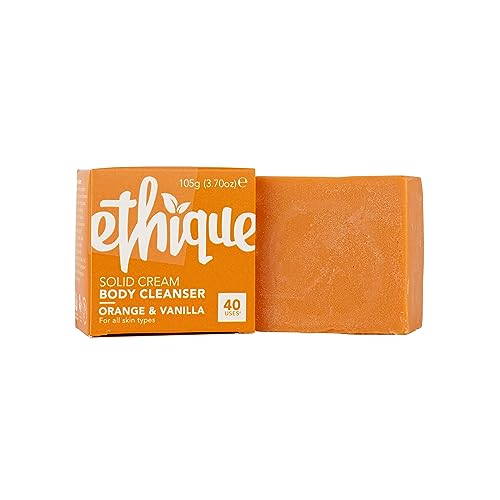
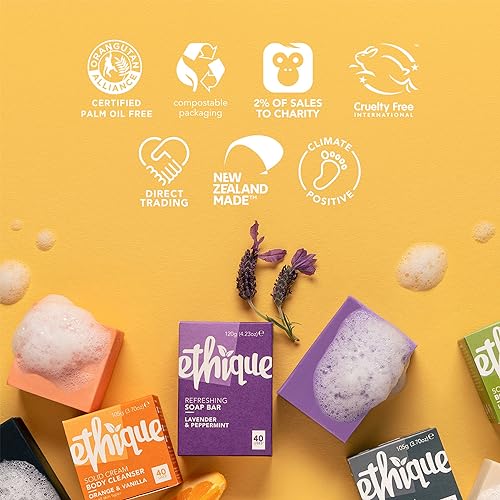
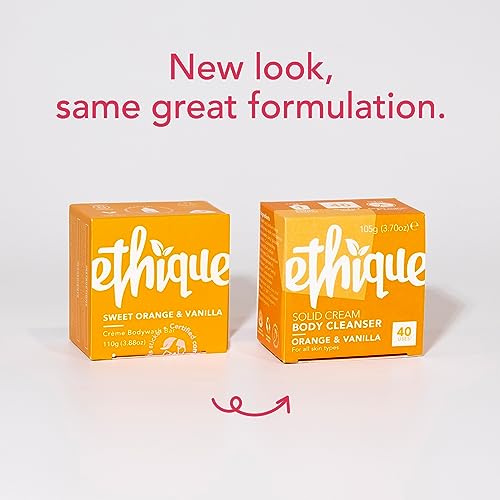

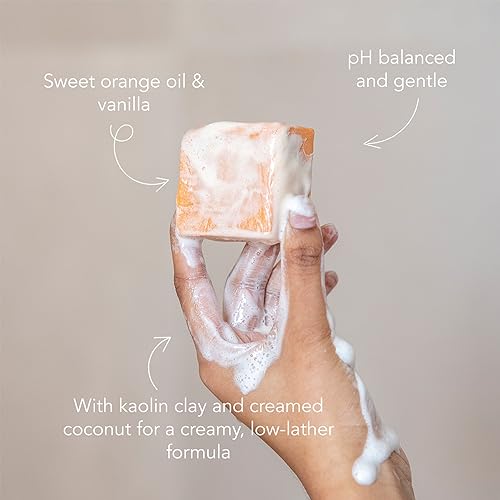
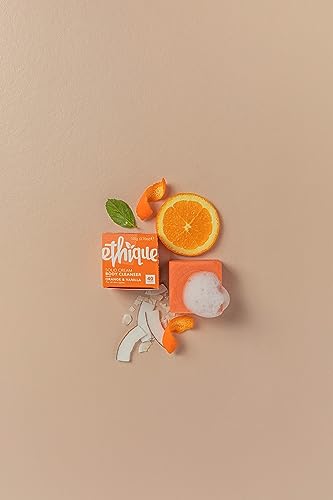
Ethique Body Wash - Hydrating, pH Balanced for Sensitive Skin, Vegan & Plastic-Free - 3.7 oz


Benzyl Alcohol
High RiskBenzyl alcohol is a naturally occurring and synthetic aromatic alcohol commonly used as a solvent, preservative, and fragrance ingredient in various products. It is found in both plant sources and as a synthetic compound, functioning primarily to maintain product stability and enhance fragrance profiles.
Sustai Insights
Benzyl alcohol serves effectively as a preservative and solvent, contributing to product stability and sensory qualities. However, it poses potential health risks, particularly as an allergen, with high concern for immunotoxicity. Environmental risks include being a pollutant with low bioaccumulation potential. Regulatory agencies have established restrictions on its use in certain products. Overall, the risk level associated with benzyl alcohol is assessed as high, necessitating careful consideration of its use and potential alternatives.
Cyamopsis Tetragonoloba (Guar) Gum
Medium RiskCyamopsis tetragonoloba (guar) gum is a resinous substance derived from the seeds of the guar plant. It primarily functions as a thickening and stabilizing agent in various cosmetic and personal care products, enhancing texture and consistency.
Sustai Insights
Guar gum is valued for its thickening capabilities and is derived from a renewable source, contributing to its sustainability credentials. However, it poses moderate allergenic potential and low risks for carcinogenicity and reproductive toxicity. Environmental concerns are minimal, with no significant pollutant or bioaccumulation risks identified. Regulatory status is favorable, with no major restrictions noted. Users should practice caution with sensitive individuals, and alternatives like xanthan gum may serve as effective substitutes. Overall, the risk level associated with guar gum is assessed as medium, warranting careful consideration in product formulation.
Limonene
Medium RiskLimonene is a scent ingredient and solvent naturally found in citrus fruits, commonly used in personal care and cleaning products for its fragrant properties. It serves as a flavoring agent and enhances the overall sensory experience of products.
Sustai Insights
Limonene offers functional benefits such as acting as a solvent and fragrance enhancer. However, it carries a high allergenic potential, which can trigger skin or respiratory sensitivities in some individuals. Environmental concerns include moderate persistence and bioaccumulation, along with potential ecotoxicity. Regulatory restrictions necessitate verification in products containing this ingredient. Overall, the risk level is assessed as medium, emphasizing the importance of cautious use, particularly for sensitive populations. Safer alternatives may be considered to mitigate these risks.
Cocos Nucifera (Coconut)
Medium RiskCocos Nucifera, commonly known as coconut, is derived from the coconut palm. It is widely used in various cosmetic and personal care products for its moisturizing properties, acting as an emollient and skin-conditioning agent, enhancing texture and hydration.
Sustai Insights
Cocos Nucifera offers functional benefits such as effective moisturization and conditioning for the skin, while being biodegradable and often sustainably sourced. Health risks are minimal, with low concerns for carcinogenicity, allergies, and reproductive toxicity. Environmental risks are also low, as it does not accumulate in organisms or significantly pollute. Regulatory bodies do not impose restrictions, supporting its overall low-risk status. Safe usage practices include patch testing for sensitivities, though alternatives like shea butter or jojoba oil may offer similar benefits.
Citrus Aurantium Dulcis (Orange) Peel Oil
Medium RiskCitrus aurantium dulcis (orange) peel oil is derived from the peel of oranges and is commonly used in cosmetic and personal care products for its fragrance and potential skin benefits. It is known for its aromatic properties and is often included in formulations aimed at enhancing scent profiles.
Sustai Insights
Citrus aurantium dulcis (orange) peel oil offers functional benefits such as providing a pleasant scent and potential antimicrobial properties. However, it poses a high allergy risk and may cause skin irritation in sensitive individuals. Environmental concerns include moderate persistence and potential to contribute to pollution. Regulatory warnings indicate restrictions on use in certain products. Overall, the risk level is assessed as medium, and users are advised to practice caution, particularly those with known allergies. Alternatives like sweet orange essential oil may provide similar benefits with potentially lower risks.
Mica
Low RiskMica is a type of highly brittle silicate mineral commonly used in cosmetics and personal care products for its reflective properties and texture. It serves primarily as a colorant and opacifying agent, enhancing the aesthetic appeal of formulations.
Sustai Insights
Mica provides functional benefits such as adding shimmer and improving the texture of cosmetics. It is generally considered low risk concerning health concerns like carcinogenicity and allergenic potential. However, there are risks associated with its persistence and potential for bioaccumulation in the environment. Regulatory bodies have noted some restrictions on mica sourcing due to ethical concerns surrounding mining practices. Overall, while mica has low health risks, its environmental impact necessitates careful sourcing and consideration of alternatives like synthetic colorants or other natural minerals.
Dehydroacetic Acid
Low RiskDehydroacetic acid is a synthetic preservative commonly used in cosmetic and personal care products to inhibit microbial growth and extend shelf life.
Sustai Insights
Dehydroacetic acid offers effective preservation, enhancing product stability. It is considered low risk for carcinogenicity, allergies, and reproductive toxicity, with minimal environmental impact. Regulatory bodies report no significant hazards, and its use is generally accepted. However, precautions should be taken to avoid occupational exposure. Alternatives include natural preservatives like tocopherol. Overall, the assessment indicates a low-risk profile.
Sodium Cocoyl Isethionate
Low RiskSodium cocoyl isethionate is a surfactant derived from coconut oil, commonly used in cosmetic formulations. It functions as a cleansing and foaming agent, contributing to the texture and effectiveness of personal care products such as shampoos and body washes. It helps to remove dirt and oils from the skin and hair.
Sustai Insights
Sodium cocoyl isethionate offers functional benefits as a gentle surfactant that effectively cleanses without stripping moisture. It is biodegradable and derived from renewable sources, enhancing its sustainability profile. Health risks are low, with minimal potential for irritation or allergies noted. Regulatory bodies have not imposed significant restrictions, indicating a favorable risk assessment overall. Usage should be within recommended concentrations to maintain safety. Alternatives include milder surfactants like decyl glucoside for those seeking gentler options. Overall, the ingredient is assessed to have a low risk.
Decyl Glucoside
Low RiskDecyl glucoside is a glucose-based surfactant derived from natural sources, primarily used as a mild cleansing agent in personal care products. It effectively reduces surface tension, allowing for improved mixing of ingredients and enhanced cleansing properties without stripping natural oils from the skin.
Sustai Insights
Decyl glucoside offers functional benefits as a non-ionic surfactant, making it suitable for sensitive skin formulations. It is biodegradable and derived from renewable resources, supporting sustainability. Health risks are primarily low, with minimal concerns regarding irritation and allergies. Environmental risks are low, as it does not significantly contribute to pollution or bioaccumulation. Regulatory status is generally favorable, with low restrictions noted. Overall, decyl glucoside presents a low risk for use in consumer products, making it a suitable choice for gentle formulations.
Stearic Acid
Low RiskStearic acid is a naturally occurring fatty acid commonly found in animal and vegetable fats. It functions primarily as an emulsifier, thickener, and stabilizer in cosmetic and personal care products, providing texture and consistency.
Sustai Insights
Stearic acid offers functional benefits such as effective emulsification and stabilization of formulations. It is derived from renewable sources and is biodegradable, contributing to its sustainability profile. Health risks are low, with minimal concerns regarding carcinogenicity, allergies, or reproductive toxicity. Environmental risks are also low, with no significant pollutants or bioaccumulation concerns noted. Regulatory bodies, including the FDA, do not impose restrictions on its use. Overall, stearic acid is assessed as low risk, and its safe usage practices are well-established, with no significant alternatives needed.
Vegetarian Glycerin
Low RiskVegetarian glycerin, also known as glycerol, is a colorless, odorless, and viscous liquid derived from plant sources. It is primarily used as a humectant, solvent, and emollient in various personal care products, helping to retain moisture and improve texture.
Sustai Insights
Vegetarian glycerin offers functional benefits as an effective humectant, promoting hydration and skin smoothness. It is biodegradable and typically sustainably sourced. Health risks associated with glycerin are low, with no significant concerns for carcinogenicity, allergens, or reproductive toxicity. Environmental risks are minimal, and it is not subject to major regulatory warnings. Overall, the risk level for this ingredient is low, making it a safe choice in formulations. Safe usage practices include ensuring proper concentrations in products, and alternatives such as propylene glycol exist but may have differing properties.
Sodium Isethionate
Low RiskSodium isethionate is an organic salt commonly used in cosmetic formulations as a surfactant and cleansing agent. It aids in the removal of dirt and oil from the skin, enhancing the overall efficacy of personal care products such as shampoos and body washes.
Sustai Insights
Sodium isethionate offers functional benefits as a mild surfactant, making it effective in cleansing formulations while minimizing irritation. It is considered to have low health risks, with no significant concerns regarding carcinogenicity, allergies, or reproductive toxicity. Environmentally, it poses minimal risks, being non-bioaccumulative and not a major pollutant. Regulatory assessments indicate it’s approved in multiple regions with few restrictions. Usage should be aligned with recommended concentrations to ensure safety. Overall, sodium isethionate is classified as a low-risk ingredient, with no notable adverse effects.
Water
Low RiskWater is a clear, colorless liquid essential for various biological processes. It serves as a solvent in formulations, facilitating the dissolution of other ingredients and enhancing product texture and application. Additionally, water plays a crucial role in hydration and is a key component in many cosmetic and personal care products.
Sustai Insights
Water is an effective solvent and hydrator, contributing to the texture and efficacy of formulations. It is biodegradable and generally regarded as safe, with low concerns regarding carcinogenicity, allergies, and reproductive toxicity. However, excessive water usage can lead to environmental concerns, particularly regarding resource depletion. Regulatory bodies do not impose restrictions on water use in cosmetics. Overall, the risks associated with water are low, making it a safe and essential ingredient.
Kaolin
Low RiskKaolin is a clay mineral composed of hydrated aluminum silicate. It is commonly used in various products for its absorbent properties, acting as a thickener, filler, and anti-caking agent in cosmetics, pharmaceuticals, and food applications.
Sustai Insights
Kaolin offers functional benefits such as effective absorption and thickening, making it valuable in personal care and industrial products. It is generally considered safe, with low concerns related to carcinogenicity, allergies, and reproductive toxicity. Environmental risks are minimal, as it is not known to be a pollutant or bioaccumulative. Regulatory bodies impose few restrictions, underscoring its low-risk profile. Safe usage practices are recommended, and while alternatives exist, kaolin remains a low-risk option in its applications.
Maltodextrin
Low RiskMaltodextrin is a saccharide material obtained from starch through partial hydrolysis. It is commonly used as a thickener, filler, or preservative in food and cosmetic products due to its ability to enhance texture and stability.
Sustai Insights
Maltodextrin serves as an effective thickener and stabilizer in various products, and it is typically derived from renewable sources. Health risks are minimal, as it poses low concerns for carcinogenicity, allergies, and developmental toxicity. Environmental impacts are also low, with no significant pollutant or bioaccumulation potential. Regulatory bodies do not impose major restrictions on its use. Overall, maltodextrin presents a low-risk profile, making it a widely accepted ingredient in food and cosmetic formulations.
Cocos Nucifera (Coconut) Oil
Low RiskCocos Nucifera (Coconut) Oil is derived from the kernels of the coconut palm. It is primarily used in cosmetic formulations for its emollient and moisturizing properties, making it suitable for skin and hair care products.
Sustai Insights
Coconut oil serves as an effective moisturizer and emollient, promoting skin hydration and softness. It is sustainably sourced and biodegradable. Health risks are minimal, with low concerns regarding carcinogenicity, allergens, and reproductive toxicity. Environmental impact is also low, as it does not contribute significantly to pollution or bioaccumulation. Regulatory bodies have not issued restrictions on its use. Overall, coconut oil presents a low risk for health and environmental concerns, making it a safe ingredient in cosmetic products.
Mica
Low RiskMica is a type of highly brittle silicate mineral commonly used in cosmetics and personal care products for its reflective properties and texture. It serves primarily as a colorant and opacifying agent, enhancing the aesthetic appeal of formulations.
Sustai Insights
Mica provides functional benefits such as adding shimmer and improving the texture of cosmetics. It is generally considered low risk concerning health concerns like carcinogenicity and allergenic potential. However, there are risks associated with its persistence and potential for bioaccumulation in the environment. Regulatory bodies have noted some restrictions on mica sourcing due to ethical concerns surrounding mining practices. Overall, while mica has low health risks, its environmental impact necessitates careful sourcing and consideration of alternatives like synthetic colorants or other natural minerals.
Dehydroacetic Acid
Low RiskDehydroacetic acid is a synthetic preservative commonly used in cosmetic and personal care products to inhibit microbial growth and extend shelf life.
Sustai Insights
Dehydroacetic acid offers effective preservation, enhancing product stability. It is considered low risk for carcinogenicity, allergies, and reproductive toxicity, with minimal environmental impact. Regulatory bodies report no significant hazards, and its use is generally accepted. However, precautions should be taken to avoid occupational exposure. Alternatives include natural preservatives like tocopherol. Overall, the assessment indicates a low-risk profile.
Sodium Cocoyl Isethionate
Low RiskSodium cocoyl isethionate is a surfactant derived from coconut oil, commonly used in cosmetic formulations. It functions as a cleansing and foaming agent, contributing to the texture and effectiveness of personal care products such as shampoos and body washes. It helps to remove dirt and oils from the skin and hair.
Sustai Insights
Sodium cocoyl isethionate offers functional benefits as a gentle surfactant that effectively cleanses without stripping moisture. It is biodegradable and derived from renewable sources, enhancing its sustainability profile. Health risks are low, with minimal potential for irritation or allergies noted. Regulatory bodies have not imposed significant restrictions, indicating a favorable risk assessment overall. Usage should be within recommended concentrations to maintain safety. Alternatives include milder surfactants like decyl glucoside for those seeking gentler options. Overall, the ingredient is assessed to have a low risk.
Cyamopsis Tetragonoloba (Guar) Gum
Medium RiskCyamopsis tetragonoloba (guar) gum is a resinous substance derived from the seeds of the guar plant. It primarily functions as a thickening and stabilizing agent in various cosmetic and personal care products, enhancing texture and consistency.
Sustai Insights
Guar gum is valued for its thickening capabilities and is derived from a renewable source, contributing to its sustainability credentials. However, it poses moderate allergenic potential and low risks for carcinogenicity and reproductive toxicity. Environmental concerns are minimal, with no significant pollutant or bioaccumulation risks identified. Regulatory status is favorable, with no major restrictions noted. Users should practice caution with sensitive individuals, and alternatives like xanthan gum may serve as effective substitutes. Overall, the risk level associated with guar gum is assessed as medium, warranting careful consideration in product formulation.
Decyl Glucoside
Low RiskDecyl glucoside is a glucose-based surfactant derived from natural sources, primarily used as a mild cleansing agent in personal care products. It effectively reduces surface tension, allowing for improved mixing of ingredients and enhanced cleansing properties without stripping natural oils from the skin.
Sustai Insights
Decyl glucoside offers functional benefits as a non-ionic surfactant, making it suitable for sensitive skin formulations. It is biodegradable and derived from renewable resources, supporting sustainability. Health risks are primarily low, with minimal concerns regarding irritation and allergies. Environmental risks are low, as it does not significantly contribute to pollution or bioaccumulation. Regulatory status is generally favorable, with low restrictions noted. Overall, decyl glucoside presents a low risk for use in consumer products, making it a suitable choice for gentle formulations.
Limonene
Medium RiskLimonene is a scent ingredient and solvent naturally found in citrus fruits, commonly used in personal care and cleaning products for its fragrant properties. It serves as a flavoring agent and enhances the overall sensory experience of products.
Sustai Insights
Limonene offers functional benefits such as acting as a solvent and fragrance enhancer. However, it carries a high allergenic potential, which can trigger skin or respiratory sensitivities in some individuals. Environmental concerns include moderate persistence and bioaccumulation, along with potential ecotoxicity. Regulatory restrictions necessitate verification in products containing this ingredient. Overall, the risk level is assessed as medium, emphasizing the importance of cautious use, particularly for sensitive populations. Safer alternatives may be considered to mitigate these risks.
Stearic Acid
Low RiskStearic acid is a naturally occurring fatty acid commonly found in animal and vegetable fats. It functions primarily as an emulsifier, thickener, and stabilizer in cosmetic and personal care products, providing texture and consistency.
Sustai Insights
Stearic acid offers functional benefits such as effective emulsification and stabilization of formulations. It is derived from renewable sources and is biodegradable, contributing to its sustainability profile. Health risks are low, with minimal concerns regarding carcinogenicity, allergies, or reproductive toxicity. Environmental risks are also low, with no significant pollutants or bioaccumulation concerns noted. Regulatory bodies, including the FDA, do not impose restrictions on its use. Overall, stearic acid is assessed as low risk, and its safe usage practices are well-established, with no significant alternatives needed.
Vegetarian Glycerin
Low RiskVegetarian glycerin, also known as glycerol, is a colorless, odorless, and viscous liquid derived from plant sources. It is primarily used as a humectant, solvent, and emollient in various personal care products, helping to retain moisture and improve texture.
Sustai Insights
Vegetarian glycerin offers functional benefits as an effective humectant, promoting hydration and skin smoothness. It is biodegradable and typically sustainably sourced. Health risks associated with glycerin are low, with no significant concerns for carcinogenicity, allergens, or reproductive toxicity. Environmental risks are minimal, and it is not subject to major regulatory warnings. Overall, the risk level for this ingredient is low, making it a safe choice in formulations. Safe usage practices include ensuring proper concentrations in products, and alternatives such as propylene glycol exist but may have differing properties.
Cocos Nucifera (Coconut)
Medium RiskCocos Nucifera, commonly known as coconut, is derived from the coconut palm. It is widely used in various cosmetic and personal care products for its moisturizing properties, acting as an emollient and skin-conditioning agent, enhancing texture and hydration.
Sustai Insights
Cocos Nucifera offers functional benefits such as effective moisturization and conditioning for the skin, while being biodegradable and often sustainably sourced. Health risks are minimal, with low concerns for carcinogenicity, allergies, and reproductive toxicity. Environmental risks are also low, as it does not accumulate in organisms or significantly pollute. Regulatory bodies do not impose restrictions, supporting its overall low-risk status. Safe usage practices include patch testing for sensitivities, though alternatives like shea butter or jojoba oil may offer similar benefits.
Sodium Isethionate
Low RiskSodium isethionate is an organic salt commonly used in cosmetic formulations as a surfactant and cleansing agent. It aids in the removal of dirt and oil from the skin, enhancing the overall efficacy of personal care products such as shampoos and body washes.
Sustai Insights
Sodium isethionate offers functional benefits as a mild surfactant, making it effective in cleansing formulations while minimizing irritation. It is considered to have low health risks, with no significant concerns regarding carcinogenicity, allergies, or reproductive toxicity. Environmentally, it poses minimal risks, being non-bioaccumulative and not a major pollutant. Regulatory assessments indicate it’s approved in multiple regions with few restrictions. Usage should be aligned with recommended concentrations to ensure safety. Overall, sodium isethionate is classified as a low-risk ingredient, with no notable adverse effects.
Benzyl Alcohol
High RiskBenzyl alcohol is a naturally occurring and synthetic aromatic alcohol commonly used as a solvent, preservative, and fragrance ingredient in various products. It is found in both plant sources and as a synthetic compound, functioning primarily to maintain product stability and enhance fragrance profiles.
Sustai Insights
Benzyl alcohol serves effectively as a preservative and solvent, contributing to product stability and sensory qualities. However, it poses potential health risks, particularly as an allergen, with high concern for immunotoxicity. Environmental risks include being a pollutant with low bioaccumulation potential. Regulatory agencies have established restrictions on its use in certain products. Overall, the risk level associated with benzyl alcohol is assessed as high, necessitating careful consideration of its use and potential alternatives.
Citrus Aurantium Dulcis (Orange) Peel Oil
Medium RiskCitrus aurantium dulcis (orange) peel oil is derived from the peel of oranges and is commonly used in cosmetic and personal care products for its fragrance and potential skin benefits. It is known for its aromatic properties and is often included in formulations aimed at enhancing scent profiles.
Sustai Insights
Citrus aurantium dulcis (orange) peel oil offers functional benefits such as providing a pleasant scent and potential antimicrobial properties. However, it poses a high allergy risk and may cause skin irritation in sensitive individuals. Environmental concerns include moderate persistence and potential to contribute to pollution. Regulatory warnings indicate restrictions on use in certain products. Overall, the risk level is assessed as medium, and users are advised to practice caution, particularly those with known allergies. Alternatives like sweet orange essential oil may provide similar benefits with potentially lower risks.
Water
Low RiskWater is a clear, colorless liquid essential for various biological processes. It serves as a solvent in formulations, facilitating the dissolution of other ingredients and enhancing product texture and application. Additionally, water plays a crucial role in hydration and is a key component in many cosmetic and personal care products.
Sustai Insights
Water is an effective solvent and hydrator, contributing to the texture and efficacy of formulations. It is biodegradable and generally regarded as safe, with low concerns regarding carcinogenicity, allergies, and reproductive toxicity. However, excessive water usage can lead to environmental concerns, particularly regarding resource depletion. Regulatory bodies do not impose restrictions on water use in cosmetics. Overall, the risks associated with water are low, making it a safe and essential ingredient.
Kaolin
Low RiskKaolin is a clay mineral composed of hydrated aluminum silicate. It is commonly used in various products for its absorbent properties, acting as a thickener, filler, and anti-caking agent in cosmetics, pharmaceuticals, and food applications.
Sustai Insights
Kaolin offers functional benefits such as effective absorption and thickening, making it valuable in personal care and industrial products. It is generally considered safe, with low concerns related to carcinogenicity, allergies, and reproductive toxicity. Environmental risks are minimal, as it is not known to be a pollutant or bioaccumulative. Regulatory bodies impose few restrictions, underscoring its low-risk profile. Safe usage practices are recommended, and while alternatives exist, kaolin remains a low-risk option in its applications.
Maltodextrin
Low RiskMaltodextrin is a saccharide material obtained from starch through partial hydrolysis. It is commonly used as a thickener, filler, or preservative in food and cosmetic products due to its ability to enhance texture and stability.
Sustai Insights
Maltodextrin serves as an effective thickener and stabilizer in various products, and it is typically derived from renewable sources. Health risks are minimal, as it poses low concerns for carcinogenicity, allergies, and developmental toxicity. Environmental impacts are also low, with no significant pollutant or bioaccumulation potential. Regulatory bodies do not impose major restrictions on its use. Overall, maltodextrin presents a low-risk profile, making it a widely accepted ingredient in food and cosmetic formulations.
Cocos Nucifera (Coconut) Oil
Low RiskCocos Nucifera (Coconut) Oil is derived from the kernels of the coconut palm. It is primarily used in cosmetic formulations for its emollient and moisturizing properties, making it suitable for skin and hair care products.
Sustai Insights
Coconut oil serves as an effective moisturizer and emollient, promoting skin hydration and softness. It is sustainably sourced and biodegradable. Health risks are minimal, with low concerns regarding carcinogenicity, allergens, and reproductive toxicity. Environmental impact is also low, as it does not contribute significantly to pollution or bioaccumulation. Regulatory bodies have not issued restrictions on its use. Overall, coconut oil presents a low risk for health and environmental concerns, making it a safe ingredient in cosmetic products.
Discover the Ethique Sweet Orange & Vanilla Cream Solid Natural Bodywash, meticulously crafted for sensitive skin. This luxurious body wash combines creamed coconut butter and cleansing Kaolin clay for a super hydrating, pH-balanced clean that nourishes without drying. Ideal for eco-conscious consumers, this plastic-free bar saves two 30ml plastic bottles, supporting a climate-positive lifestyle. With each bar lasting up to 40 uses, it offers exceptional value and durability. Choose ethical, cruelty-free, and palm oil-free ingredients that are sourced sustainably to promote fair wages in communities. Elevate your bathing experience with a product that cares for your skin and the planet.
- Hydration & Care: A nourishing blend cleanses while providing moisture, perfect for dry, sensitive skin.
- pH Balanced: Formulated to match your skin's natural acidity, promoting health and hydration.
- Long-Lasting: Each bar delivers up to 40 uses, making it a cost-effective choice for daily care.
- Plastic-Free Packaging: Contribute to environmental sustainability with recyclable and compostable packaging.
- Ethical Sourcing: Made with vegan, cruelty-free ingredients that support fair labor practices.
Subscribe & Save with Sustai
- Best Price Guarantee: Always enjoy the lowest prices on sustainable home essentials.
- No Surprises: We’ll notify you before shipping. No hidden fees, ever.
- You’re in Charge: Change, pause, or cancel your subscription anytime with ease.
- Eco-Friendly Deliveries: Our grouped shipments mean less packaging and lower emissions.
Join us on a sustainable journey. Special offers for a limited time! Prices and promotions may change.
Recommended Products
Discover the Ethique Sweet Orange & Vanilla Cream Solid Natural Bodywash, meticulously crafted for sensitive skin. This luxurious body wash combines creamed coconut butter and cleansing Kaolin clay for a super hydrating, pH-balanced clean that nourishes without drying. Ideal for eco-conscious consumers, this plastic-free bar saves two 30ml plastic bottles, supporting a climate-positive lifestyle. With each bar lasting up to 40 uses, it offers exceptional value and durability. Choose ethical, cruelty-free, and palm oil-free ingredients that are sourced sustainably to promote fair wages in communities. Elevate your bathing experience with a product that cares for your skin and the planet.
- Hydration & Care: A nourishing blend cleanses while providing moisture, perfect for dry, sensitive skin.
- pH Balanced: Formulated to match your skin's natural acidity, promoting health and hydration.
- Long-Lasting: Each bar delivers up to 40 uses, making it a cost-effective choice for daily care.
- Plastic-Free Packaging: Contribute to environmental sustainability with recyclable and compostable packaging.
- Ethical Sourcing: Made with vegan, cruelty-free ingredients that support fair labor practices.

You can have at most 2 Sustainable Steals products in your cart
Customer Reviews
Customers’ View
Customers appreciate the effectiveness and eco-friendly nature of Ethique's Sweet Orange & Vanilla Cream Solid Natural Bodywash. Many users highlight its nourishing formula, noting that it hydrates without stripping moisture, making it suitable for sensitive skin. The pleasant scent is frequently mentioned, with customers enjoying the fragrance and how well it lathers. However, some express concern over the price relative to the size, indicating a willingness to invest in a product that performs well. Additionally, the commitment to plastic-free, vegan, and cruelty-free ingredients resonates strongly with environmentally and health-conscious consumers. Overall, customers find this body wash both effective and aligned with their sustainable lifestyle.
AI-generated from the text of customer reviewsThis product is rated 5.0 of 5.0 stars.
It has received 2 reviews.




